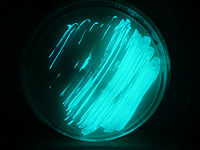Photobacterium phosphoreum
For the course duration, the article is closed to outside editing. Of course you can always leave comments on the discussion page. The anticipated date of course completion is May 21, 2009. One month after that date at the latest, this notice shall be removed. Besides, many other Citizendium articles welcome your collaboration! |
| Photobacterium phosphoreum | ||||||||||||||
|---|---|---|---|---|---|---|---|---|---|---|---|---|---|---|
 | ||||||||||||||
| Scientific classification | ||||||||||||||
| ||||||||||||||
| Binomial name | ||||||||||||||
| Photobacterium phosphoreum |
Description and significance
Photobacterium phosphoreum is a luminescent bacterium. Its physical characteristics are gram-negative, rod-like shape, plump and large (0.8-1.3 um in diameter and 1.8-2.4 um in length). It can be motile or non-motile. Those that are motile have 1-3 unsheathed polar flagella. Its optimum temperature is 18-25˚C. It emits a blue-green light.
Its major significance is its symbiotic relationship with some marine animals like fishes and squids. They have specialized organs that provide P. phosphoreum with a safe place to reside and food; while these animals use the light that the bacteria provide for camouflage and even for attracting mates.
Genome structure
Cell structure and metabolism
Ecology
Application to Biotechnology
Current Research
References
http://www.ncbi.nlm.nih.gov/Taxonomy/Browser/wwwtax.cgi?id=659
http://www.microbiologyatlas.kvl.dk/biologi/english/showmorf.asp?articleid=44
http://www.disknet.com/indiana_biolab/b203.htm
http://www.biology.pl/bakterie_sw/index_en.html
http://cibt.bio.cornell.edu/programs/archive/0608alum/lumos.pdf